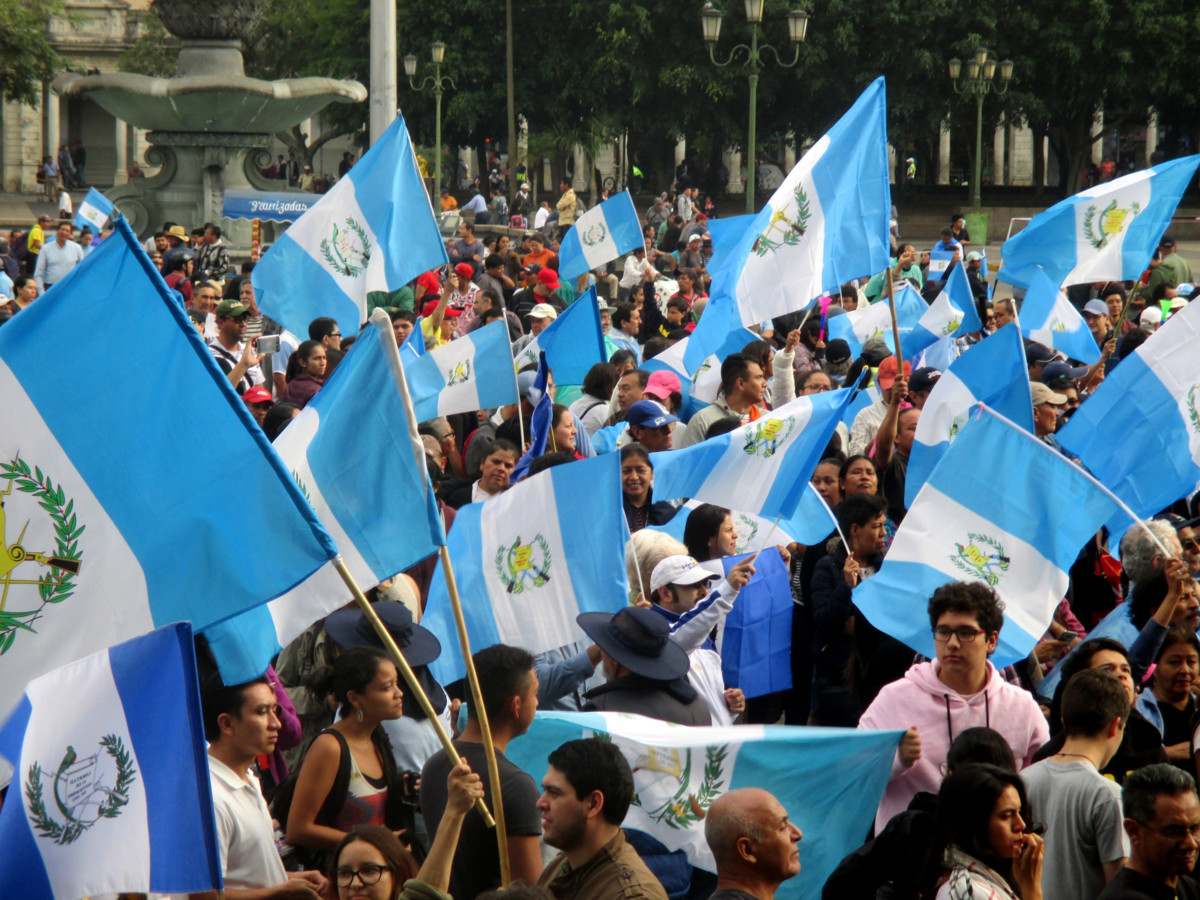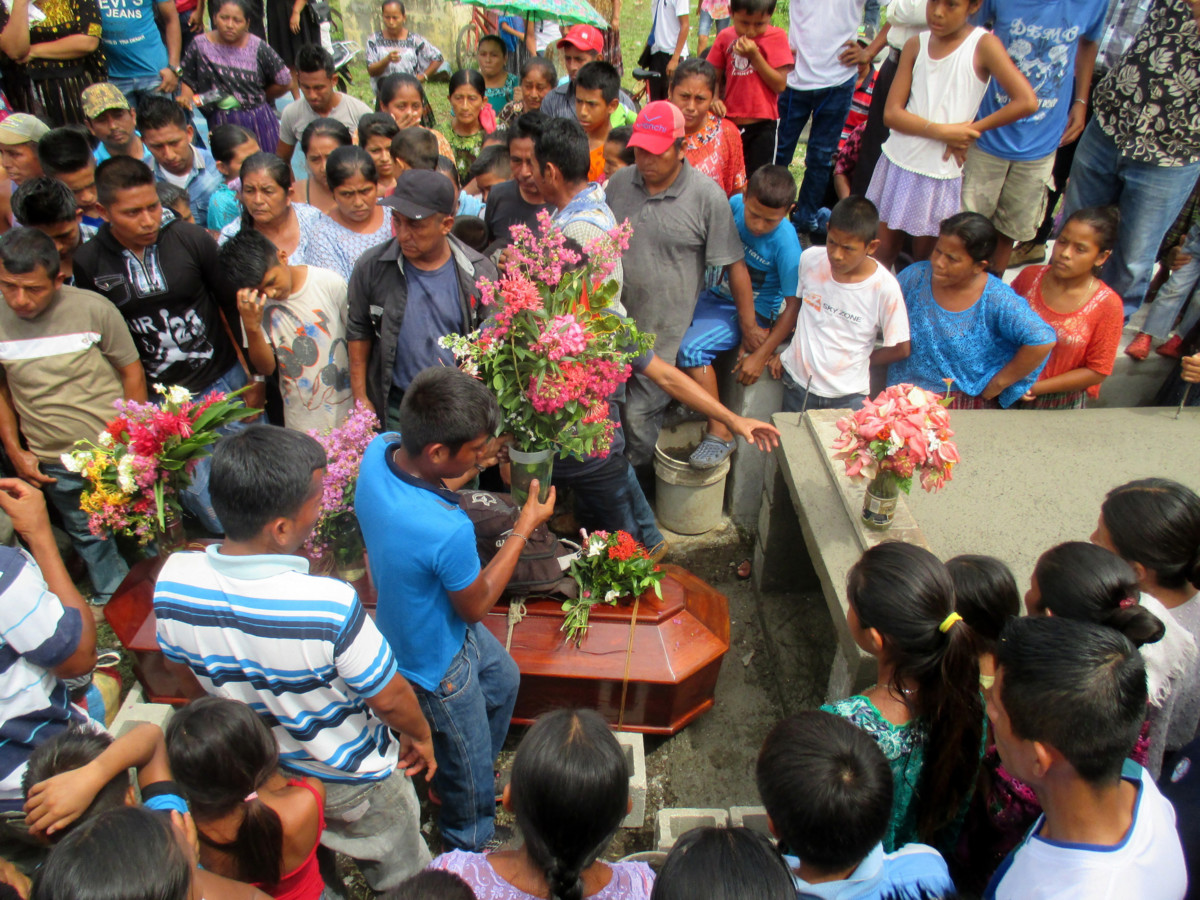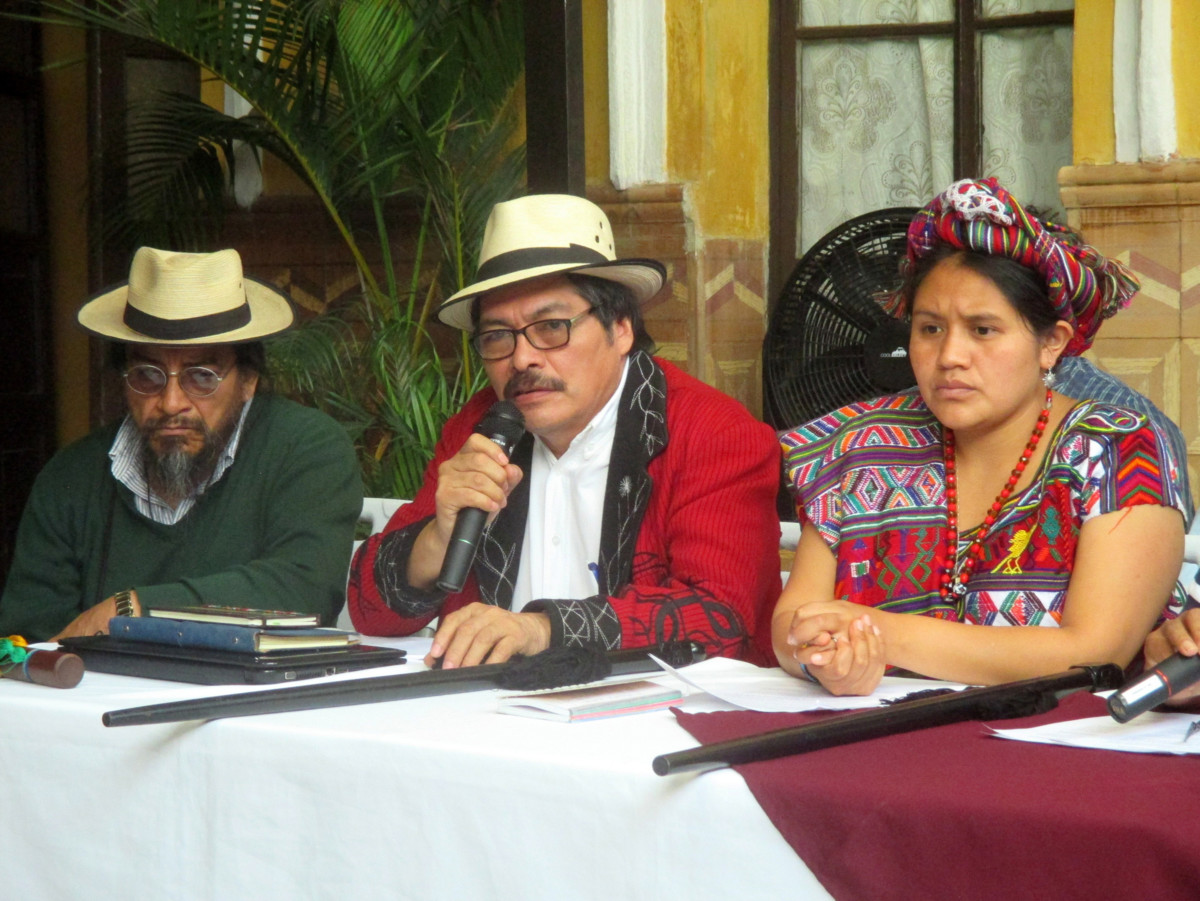Honest, paywall-free news is rare. Please support our boldly independent journalism with a donation of any size.
It started mid-morning. Military vehicles lined the street on August 31. Donated by the US back in 2013 for anti-narcotics task force operations, the green Jeep J8s were circulating in Guatemala City, including outside embassies and the offices of the UN-backed anti-corruption agency known as the International Commission against Impunity in Guatemala, or CICIG. In a country with a history of state forces carrying out acts of genocide and other atrocities during a 36-year armed conflict that only ended 22 years ago, the sudden militarization raised alarm.
“It was a surprise,” said Feliciana Herrera, one of the Maya Ixil authorities of Nebaj, in a region of the Quiché department where military forces perpetrated genocide. “When it showed up on the news and on social networks, people wondered why they were mobilizing so many army vehicles and soldiers. People wondered what was going to happen,” she told Truthout.
The answer came just after noon. Guatemalan President Jimmy Morales stood in front of more than 70 military and police officials to announce that he would not be renewing the mandate of the anti-corruption commission. Morales made his announcement while proceedings to consider stripping him of his immunity from prosecution for illegal campaign financing continue. Morales has cause for concern. In 2015, President Otto Pérez Molina was forced to resign and was subsequently arrested due to investigations led by the anti-corruption commission. Pérez Molina and most of his administration are in jail pending trial.
“It’s the government’s fear of being investigated,” said Herrera. “We’re indignant about all of this, because many communities, even though we’re far from the capital, we believe in justice and we believe in CICIG.”
Indigenous authorities throughout Guatemala are united in their condemnation of the government’s actions. They are calling for the anti-corruption commission to stay and hope the commission will branch out to investigate corruption networks of officials, military personnel and companies operating in Indigenous territories.
Indigenous Maya, Xinka and Garifuna authorities gathered at a September 3 press conference to respond to Morales’s announcement. The president’s attack on the anti-corruption commission is supported by “military forces, politicians, economic elites, and national and foreign businesspeople,” they said in a statement.
The commission’s current mandate will be up in September 2019. During President Morales’s August 31 announcement, he stated that the anti-corruption commission would have the year to transfer its capacities over to the national Office of the Public Prosecutor.
Four days later, on September 4, the government announced that CICIG’s head commissioner, Iván Velásquez, currently in the US, would not be allowed to re-enter the country on the grounds that the Guatemalan National Security Council claims he is a security threat. Velásquez has been manipulating justice and polarizing the country, government officials alleged at a September 6 press conference. The government asked the UN to designate a new head commissioner of CICIG, but UN Secretary-General António Guterres asked Velásquez to remain at the helm of the anti-corruption commission from outside Guatemala until the situation becomes more clear.

The embassy issued two statements following Morales’s announcement on August 31. The first took note of Morales’s decision, stated that the US believes the anti-corruption commission to be an important partner in fighting impunity, improving governance and holding the corrupt accountable, and pledged continued support Guatemala’s struggle against corruption and impunity. The second statement advised that the embassy was monitoring the use of the donated military jeeps, which had been seen in the vicinity of CICIG and the US embassy.
The following day, US Secretary of State Mike Pompeo tweeted about the US relationship with Guatemala, with no mention whatsoever of the anti-corruption commission or the unfolding crisis. “Our relationship with Guatemala is important. We greatly appreciate Guatemala’s efforts in counternarcotics and security,” he wrote in his September 1 tweet.
Pompeo called Morales on September 6, reiterating US support for Guatemalan sovereignty. “The Secretary expressed continued support of the United States for a reformed CICIG and committed to continue working with Guatemala on implementing the reforms in the coming year,” according to a State Department statement. The substance of those reforms remains unclear.
Several Democratic Party lawmakers in the US strongly condemned the measures and threatened possible repercussions. “We urge President Morales to reverse his ill-advised decision. If he is unwilling to do so, Congress must do everything in our power to appropriately adjust U.S. assistance to the Guatemalan government,” congressional Reps. Eliot Engel, a ranking member of the House Committee on Foreign Affairs, and Albio Sires, a ranking member of the House Foreign Affairs Subcommittee on the Western Hemisphere, said in a joint statement September 4 in response to the ban of Velásquez.
The non-renewal of the anti-corruption commission’s mandate, and especially the announcement that Velásquez would not be permitted to re-enter Guatemala, also prompted a multitude of strong condemnations from European countries and international human rights organizations.
Indigenous authorities are calling for sustained international responses. “We reiterate our call to the international community to condemn all government actions that, together with mafias, corruption networks, impunity and influence peddling, are endangering life, the construction of peace, democracy and justice in Guatemala,” they said in their September 3 statement.
Corruption and impunity are embedded at all levels of government, from top to bottom, said Rigoberto Juárez. A Maya Q’anjob’al authority and a representative of the Q’anjob’al, Chuj, Akateka, Popti and Mestizo Plurinational Government, Juárez was arrested in 2015 and jailed on charges related to community struggle against a hydroelectric dam project. He spent 16 months in jail before a court ruled in his favor. At the time, he was one of several dam-related political prisoners from the Huehuetenango department.
“Corruption and impunity are the mode of operation of the state of Guatemala and they have been since its foundation,” Juárez told Truthout. “We understand that what CICIG has done in these last 10 years is get into the structures of the biggest powers of the Guatemalan state — in this case, the executive and legislative [branches].”
The anti-corruption commission’s investigations have largely been centered around corruption in the capital. Indigenous authorities consider that CICIG’s work has only just begun. They hope a next step would be the dismantling of corruption and impunity networks around the country and in Indigenous territories.
“There’s a dynamic that is not being addressed right now in Guatemala, and that is: Who is generating corruption? Who is feeding corruption in this country? Obviously, it is the companies, and none of them have been affected yet,” said Juárez.
With regard to hydroelectric dam and mining projects, corruption and impunity encompass failure to consult and obtain the consent of affected Indigenous communities, irregularities in licenses and repression. Juárez pointed to the Escobal silver mine run by Tahoe Resources, Cementos Progreso’s operations in San Juan Sacatepéquez, and the dams in Huehuetenango as examples of corporate projects tied to violence and killings, for which perpetrators are rarely prosecuted.

Extractive industry project licenses granted via corrupt processes were one of the main reasons Indigenous authorities mobilized last year to defend the anti-corruption commission and Velásquez, said Gladys Tzul, a Maya K’iche’ sociologist studying the relationships and conflicts between Indigenous community governance and state power. Last year, Morales declared Velásquez persona non grata, but the Constitutional Court reversed the measure.
“Calling it the struggle against corruption hides the plural topics and meanings that exist. I think that everybody, each sector, has their own agenda of struggle against corruption,” said Tzul.
There are the extractive industry licences in Indigenous territories, the health system corruption scandals and countless other issues motivating people to come together. Following Morales’s August 31 announcement that he would not renew CICIG’s mandate, people showed up in the Guatemala City central plaza to protest that very afternoon, and more people arrived the following day.
At the moment, the Constitutional Court is considering several motions filed against actions by Morales and the government to ban Velásquez. There is also widespread concern that the government could disobey or even dissolve the court, should it rule the ban was unconstitutional.
However the crisis unfolds, one thing is certain, said Tzul: “They cannot contain the generalized discontent.”
Trump is silencing political dissent. We appeal for your support.
Progressive nonprofits are the latest target caught in Trump’s crosshairs. With the aim of eliminating political opposition, Trump and his sycophants are working to curb government funding, constrain private foundations, and even cut tax-exempt status from organizations he dislikes.
We’re concerned, because Truthout is not immune to such bad-faith attacks.
We can only resist Trump’s attacks by cultivating a strong base of support. The right-wing mediasphere is funded comfortably by billionaire owners and venture capitalist philanthropists. At Truthout, we have you.
Truthout has launched a fundraiser to raise $50,000 in the next 9 days. Please take a meaningful action in the fight against authoritarianism: make a one-time or monthly donation to Truthout. If you have the means, please dig deep.
